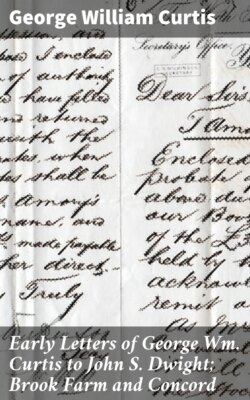Читать книгу Early Letters of George Wm. Curtis to John S. Dwight; Brook Farm and Concord - George William Curtis - Страница 6
На сайте Литреса книга снята с продажи.
III
ОглавлениеThe relations of Curtis to his teachers at Brook Farm were cordial and appreciative, but they were especially so with John S. Dwight, with whom he studied music. When he left the farm, an intimate and confidential correspondence began between them, and this continued until Curtis went to Europe. After he returned it was resumed, but the interchange of letters was not so frequent. They continued to write to each other almost to the end of Dwight's life, however, and their friendship was always sympathetic and confidential. The letters of Dwight have not been preserved, with two or three exceptions, but those of Curtis still exist in unbroken succession, and are presented to the public in this volume. In these days, when we complain of the decay of letter-writing, they afford a remarkably good specimen of youthful effort in that kind of literature.
To Dwight there were sent by Curtis several poems, which were printed in the Harbinger, and he also sent two letters from New York on musical topics. Two of his letters to Dwight from Europe were also printed in the Harbinger. After he was settled in New York, Curtis did his part in an effort to get Dwight established in that city. When Dwight began his Journal of Music, Curtis wrote for it frequently over the signature of "Hafiz." It is safe to say that these contributions were not paid for, but were the result of a desire to aid his friend in his musical enterprise. They were of the nature of passing comments on the musical performances of the day, but they were worthy of the pages in which they appeared.
John Sullivan Dwight was born in Court Street, Boston, May 13, 1813, the son of Dr. John Dwight and his wife Mary. He was educated at the Derne Street Grammar School and the Boston Latin School, from which he entered Harvard College. As a boy he was a devoted reader of books, studious in his habits, but little inclined to active or practical pursuits. When about fifteen, he began to take an interest in music, and from his father he received the best instruction in that art.
Young Dwight entered Harvard in 1829, and he carried through the studies of the course with a fair degree of success. He gave much attention to music, joined the Pierian Sodality, and was an earnest reader of the best poetry. He gave the class poem on his graduation, in 1832. During his Senior year he taught at Northborough, and following his graduation he spent a year as a tutor in a family at Meadville, Pennsylvania. In the autumn of 1834 he entered the theological school at Harvard, and graduated therefrom in August, 1836, his dissertation being on "The Proper Character of Poetry and Music for Public Worship," which was published in the Christian Examiner for that year.
Dwight's interest in music led him to take a leading part in bringing together, in 1837, those recent graduates of the college who were of like mind with himself; and a society was organized for the purpose of promoting its study. In 1840 the name was changed to that of the "Harvard Musical Association"; in 1845 it was incorporated, and in 1848 the place of meeting was transferred to Boston.
It was three years and a half after Dwight left the theological school before he had secured a pulpit. He preached nearly every Sunday, but he had become a member of the Transcendental Club, he was in sympathy with Emerson and Parker, and the churches did not find his preaching acceptable. He wrote several papers for the Christian Examiner, and reviewed a number of books in the same periodical. The first review of Tennyson published in this country he gave to the public in that journal. In 1838 he published in the series of translations edited by George Ripley, under the general title of "Specimens of Foreign Standard Literature," a volume of "Select Minor Poems, Translated from the German of Goethe and Schiller, with Notes." Several of Dwight's friends aided him in this translation, especially on the poems of Schiller; but the valuable notes appended were furnished by himself. The volume was dedicated to Carlyle, who wrote a characteristic letter in giving his permission, and a still more interesting one in acknowledging the receipt of the book.
In May, 1840, Dwight became the minister of the little Unitarian parish at Northampton, and the ordination sermon was preached by George Ripley, the address to the minister being given by Dr. W.E. Channing. From the first the people were not fully agreed as to Dwight's preaching, and the objections gradually increased as his strong Transcendental habits of thought began to be more clearly manifest. A few persons of thoughtful and more distinctly spiritual cast of mind were warmly drawn to him, but the majority grew more and more opposed to him, and he withdrew from the parish after a year and a half. During his stay in Northampton he wrote for The Dial, for one or two musical journals, planned several extended literary undertakings, and gave lectures before the American Institute of Instruction and the Harvard Musical Association. In The Dial was published one of his sermons, under the title of "Religion of Beauty," and another called "Ideals of Every-day Life." At the end of that on the religion of beauty was printed a poem of Dwight's, which has been often credited to Goethe, and is usually given the title of
